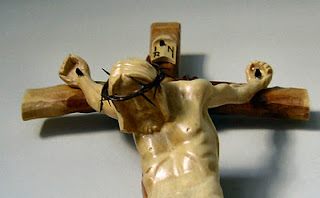
I received a notice of a new book by Joan Chittester today. It began with the following quotation: [[Christians are not people of the cross. Christians are people of the empty tomb who know that every step on the way to light is Light.]]
Now, I greatly respect Sister Joan Chittester's work and life. I also think I understand what she is trying to say here; had she not said, "Christians are not people of the cross," I would simply agree with her comment and move on. But the assertion that Christians are not people of the Cross is wrong. Just as one does not have a sound theology of the cross without resurrection, neither does one have a sound theology of resurrection without the continuing presence of and focus on the cross. As Paul once rightly said, "I want to know Christ crucified and only Christ crucified."
There is an approach to Jesus' death and resurrection which divides the two events and treats resurrection as the undoing of what happened on the cross. It as though the cross was ONLY some sort of tragedy and not also revelatory of God and authentic human existence. What I have written here before is a second approach to the cross. It says that resurrection makes eternally valid what was revealed on the cross and that is something we must always bear in mind. Unfortunately, despite the fact that this is only a partial quote, Sister Joan's bald statement makes me think she has missed this basic point. Ours is assuredly a God which darkness cannot overcome, and one who regularly transforms darkness into light. We know this because darkness has indeed been transfigured in our own lives. Even so, as yet unredeemed darkness is also real in our world.
Therefore we are people of the cross; it is simply that we are people of the paradoxical cross of triumph as well as that of tragedy. We are people of the cross because it is the cross which reveals who we are in light of sin: we are the ones who, if our own autonomy or honor is threatened, will do whatever we can to destroy life, castigate innocence, and profane the sacred. We are people of the cross because the cross reveals that authentic humanity depends totally on God, even in the face of the worst injustice, shame, and horror we might experience. The cross makes this kind of humanity real in space and time, and baptism initiates us into THIS particular death and the new life it revealed (made known and real). But we are also people of the cross because it is the cross that reveals (again, makes known and real) the fact that our God is one who enters into the deepest, darkest, most godless places in our lives and world; he is a God who refuses to allow anything separate us from him.
Had the crucifixion remained the last word, it is true that we would not be people of the cross. But the empty tomb allows the cross to say that death did not and will never have the last word. Still, it is precisely for this reason that we cannot allow the cross to simply fade into the past as a terrible accident or a tragedy which God corrected and expunged with resurrection. In light of the resurrection the cross is capable of revealing us to ourselves --- both the horrors we become under the sway of sin and the saints we become under the sway of grace. An empty tomb does not and cannot do this. The cross is similarly capable of saying that godless death does not have the last word; God's love does. An empty tomb may merely speak of the righteous (or the messianic!) and the fact that God rescues them from death. The cross, however, reveals not only that sin and godlessness are powerful realities, but that our God loves all of us in spite of our participation in these realities and died for us while we were yet sinful, godless people.
God forbid that we become pseudo Christians somehow subtly enamored with the horror, blood, criminality, torture, shame and suffering of the cross. Pseudo-mystical misery is not what we or the cross is about. Self-proclaimed and self-absorbed "Victim souls" who, it seems, cannot begin to imagine the real degree of suffering existing in the lives of their neighbors and who seem to believe the cross was ineffective in dealing with sin, may be "into" this kind of thing, but Christians are not. While it is possible to find instances of people even today offering to suffer so that God might save someone else from cancer or other serious illnesses, such a God and such bargaining with God is contrary to the revelation of the cross itself. The empty tomb certainly helps remind us we are not people of the cross in these distorted senses. Yet, the authentic cross is the symbol of a God who will not abandon us and instead will enter exhaustively into our lives and world to redeem and recreate them. In forgiveness and mercy his justice-creating love will bring life out of death, meaning out of meaninglessness, triumph out of tragedy, honor out of shame, and vindication out of failure. In this sense we are indeed people of the cross and therefore of the empty tomb.
24 January 2012
We are People of the Cross
Posted by
Sr. Laurel M. O'Neal, Er. Dio.
at
1:09 AM
![]()
![]()
Labels: Joan Chittister OSB, People of the Cross, Sister Joan Chittister, Theology of the Cross







































